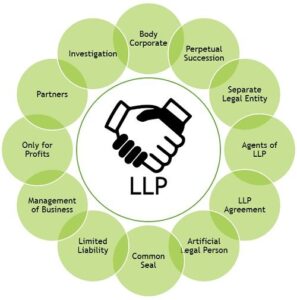
User Intent
Users searching for “What is LLP and its features?” are likely business professionals, entrepreneurs, or students looking for a detailed yet easy-to-understand guide on Limited Liability Partnerships (LLPs). They may want to know how LLPs work, their benefits, limitations, and a comparison with other business structures.
Introduction
Starting a business requires choosing the right legal structure. One popular option is a Limited Liability Partnership (LLP), which blends the features of a partnership and a corporation. LLPs offer the flexibility of a partnership while limiting personal liability for partners.
In this article, we will explain what an LLP is, how it works, its applications, advantages, limitations, and a comparative analysis with other business entities. Let’s dive in!
Definition: What is an LLP?
An LLP (Limited Liability Partnership) is a business structure where two or more partners manage a business while enjoying limited liability protection. Unlike a general partnership, an LLP ensures that one partner is not liable for another partner’s misconduct or negligence.
Key Features of LLP:
- Legal Recognition: An LLP is a separate legal entity from its partners.
- Limited Liability: Partners are responsible only for their investment, not personal assets.
- Perpetual Succession: LLPs continue to exist despite changes in partnership.
- No Minimum Capital Requirement: Can be formed with any amount of capital.
- Flexible Management: Partners can define roles and responsibilities without strict regulations.
Application of LLP (Where is LLP Used?)
LLPs are widely used in various industries due to their flexible structure and liability protection. Here are some major applications:
1. Professional Services
Many professionals, such as lawyers, accountants, consultants, and architects, prefer LLPs to safeguard personal assets while working collaboratively.
2. Small and Medium Enterprises (SMEs)
Startups and small businesses use LLPs to operate efficiently with limited risk.
3. Joint Ventures
Businesses collaborating for specific projects opt for LLPs to share profits and risks fairly.
4. Investment and Financial Firms
Investment firms use LLPs to structure funds while maintaining legal protection.
Benefits of LLP (Why Choose LLP?)
1. Limited Liability Protection
Each partner’s liability is restricted to their capital contribution. This means personal assets remain safe even if the busines
s incurs losses.
2. Separate Legal Entity
An LLP has its own legal identity, allowing it to own property, enter contracts, and sue or be sued independently.
3. Flexible Management Structure
Unlike private limited companies, LLPs do not require a strict board of directors or annual meetings, offering operational freedom.
4. Tax Benefits
LLPs are not subject to corporate tax; instead, profits are taxed at individual partner levels, reducing the overall tax
burden.
5. No Minimum Capital Requirement
LLPs can be started with any amount of capital, making them accessible to small entrepreneurs.
6. Perpetual Succession
The LLP remains intact even if partners exit or change, ensuring business continuity.
Limitations of LLP (Challenges to Consider)
While LLPs offer several advantages, they also have some limitations:
1. Cannot Raise Public Funds
Unlike companies, LLPs cannot raise money through public shares or equity investments.
2. Higher Compliance Costs
Though simpler than corporations, LLPs still require annual filings, audits (if turnover exceeds a certain limit), and tax compliances.
3. Difficulty in Ownership Transfer
Transferring ownership in an LLP is more complex than in a company since it requires partner agreement and legal procedures.
4. Lesser Credibility Compared to Companies
Many investors prefer Private Limited Companies over LLPs due to better legal structures and credibility.
LLP vs Other Business Structures (Comparative Table)
| Feature | LLP | Private Limited Company | Partnership |
|---|---|---|---|
| Legal Status | Separate Entity | Separate Entity | Not a Separate Entity |
| Liability | Limited | Limited | Unlimited |
| Ownership Transfer | Restricted | Easy | Not Allowed |
| Compliance | Moderate | High | Low |
| Taxation | Individual Partners | Corporate Tax | Individual Partners |
| Perpetual Existence | Yes | Yes | No |
Conclusion
An LLP is an excellent choice for professionals, startups, and joint ventures seeking a flexible business s
tructure with limited liability protection. However, it is not ideal for businesses that need public investment or high credibility. Choosing an LLP depends on your business goals, investment plans, and long-term vision.
FAQs (Frequently Asked Questions)
1. Who can form an LLP?
Any two or more individuals or corporate entities can form an LLP under legal regulations.
2. How is an LLP taxed?
LLPs are not taxed as a separate entity; instead, profits are taxed at the partner level.
3. Is an LLP better than a Private Limited Company?
It depends on the business type. LLPs are better for professional firms, while Private Limited Companies suit startups looking for investment.
4. Can an LLP be converted into a Private Limited Company?
Yes, an LLP can be converted, but the process involves legal and regulatory compliance.
5. What are the compliance requirements for an LLP?
LLPs must file annual returns, income tax returns, and audits (if required).
Final Thoughts
Choosing an LLP can be a strategic move for business owners who want a balance of flexibility and liability protection. However, it’s important to understand its limitations before making a decision. If your business requires public funding or easy ownership transfer, a Private Limited Company may be a better fit.
We hope this guide helped clarify LLPs and their features. If you have any questions, feel free to ask in the comments!😊
For more information visit this site: https://www.mca.gov.in
For further details access our website: https://vibrantfinserv.com/
